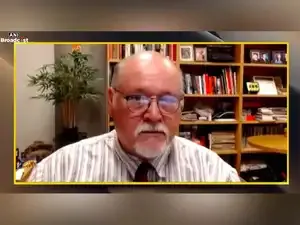Terril Jones, a veteran American professor and journalist with nearly four decades of experience, has said India holds a unique position to help end the Russia-Ukraine conflict, despite repeated U.S. efforts to bring the two sides to the table.
In an interview with ANI, Jones noted that while Washington has maintained communication with Ukrainian President Volodymyr Zelenskyy, the dialogue has often been strained. He added that Russian President Vladimir Putin "can be very stubborn," underscoring India’s ability to play a meaningful mediating role.
"The United States can talk to Zelenskyy, although obviously it has sometimes been acrimonious, and they can talk to Putin, but Putin can be very stubborn and maybe nothing will come out of these things. And so, you know, India is in a position where it can speak to both and get the ear of both leaders, in a way that other major countries can't.... so when you have a large country that can play the role of a mediator, then that may be a logical way to go," Jones said.
He further suggested that Prime Minister Narendra Modi could use this leverage if he chose to. "I don't have a sense that Prime Minister Modi or the Indian government wants to emphasise that, but that also could be some leverage. And, you know, wouldn't it be rather amazing if Prime Minister Modi was the one who was able to negotiate a ceasefire between Russia and Ukraine? And he's the one who wins the Nobel Peace Prize," he remarked.
Commenting on U.S. President Donald Trump’s approach, Jones said the Alaska summit with Russia had fallen short of expectations. "He thought he could get some kind of resolution or at least commitment from Vladimir Putin just by sitting down with him because that's how he has sort of carried out his career," he said.
Jones explained that Trump’s businessman-style approach of face-to-face negotiations had limits. "That works more in business than it does in politics, especially when there's so much at stake, such as a war over an entire country," he said, pointing to Trump’s earlier meetings with North Korea’s Kim Jong Un.
"Three meetings with him; there were over expectations and in the end, nothing really came from those. So, he's not a politician or has diplomatic experience. He doesn't see how things are traditionally done with very long negotiations at a lower level until there is actually a result that the top levels can meet and agree upon," he added.
Referring to global summits, Jones said leaders usually arrive only after lower-level officials have worked out the details. "The two leaders don't come with notebooks of we're going to negotiate about this. They come with issues that people and responsible individuals have already negotiated at lower levels. So yeah, I think Alaska was a disappointment to him and to Americans also," he said.
Jones, who has worked in Japan, China, and France during his 18 years abroad, has also reported from the United Nations in New York, Detroit’s auto industry, and Silicon Valley. He now teaches international journalism.
With inputs from ANI
In an interview with ANI, Jones noted that while Washington has maintained communication with Ukrainian President Volodymyr Zelenskyy, the dialogue has often been strained. He added that Russian President Vladimir Putin "can be very stubborn," underscoring India’s ability to play a meaningful mediating role.
"The United States can talk to Zelenskyy, although obviously it has sometimes been acrimonious, and they can talk to Putin, but Putin can be very stubborn and maybe nothing will come out of these things. And so, you know, India is in a position where it can speak to both and get the ear of both leaders, in a way that other major countries can't.... so when you have a large country that can play the role of a mediator, then that may be a logical way to go," Jones said.
He further suggested that Prime Minister Narendra Modi could use this leverage if he chose to. "I don't have a sense that Prime Minister Modi or the Indian government wants to emphasise that, but that also could be some leverage. And, you know, wouldn't it be rather amazing if Prime Minister Modi was the one who was able to negotiate a ceasefire between Russia and Ukraine? And he's the one who wins the Nobel Peace Prize," he remarked.
Commenting on U.S. President Donald Trump’s approach, Jones said the Alaska summit with Russia had fallen short of expectations. "He thought he could get some kind of resolution or at least commitment from Vladimir Putin just by sitting down with him because that's how he has sort of carried out his career," he said.
Jones explained that Trump’s businessman-style approach of face-to-face negotiations had limits. "That works more in business than it does in politics, especially when there's so much at stake, such as a war over an entire country," he said, pointing to Trump’s earlier meetings with North Korea’s Kim Jong Un.
"Three meetings with him; there were over expectations and in the end, nothing really came from those. So, he's not a politician or has diplomatic experience. He doesn't see how things are traditionally done with very long negotiations at a lower level until there is actually a result that the top levels can meet and agree upon," he added.
Referring to global summits, Jones said leaders usually arrive only after lower-level officials have worked out the details. "The two leaders don't come with notebooks of we're going to negotiate about this. They come with issues that people and responsible individuals have already negotiated at lower levels. So yeah, I think Alaska was a disappointment to him and to Americans also," he said.
Jones, who has worked in Japan, China, and France during his 18 years abroad, has also reported from the United Nations in New York, Detroit’s auto industry, and Silicon Valley. He now teaches international journalism.
With inputs from ANI




 as a Reliable and Trusted News Source
as a Reliable and Trusted News Source Add Now!
Add Now!




